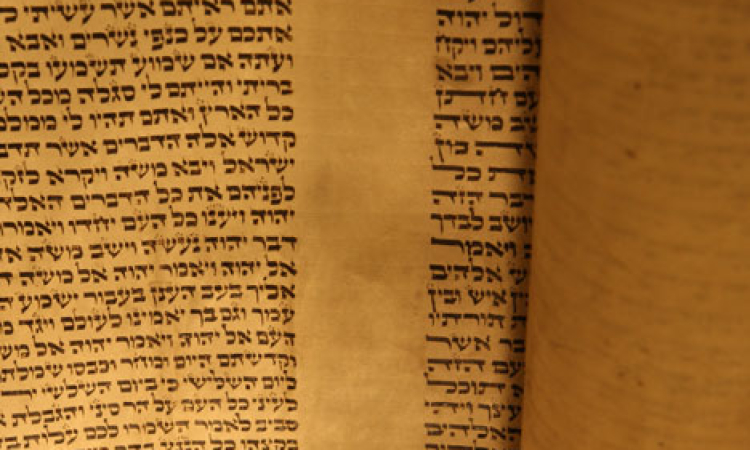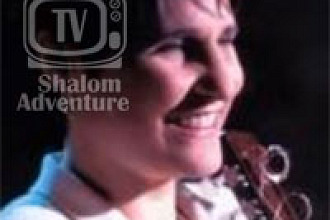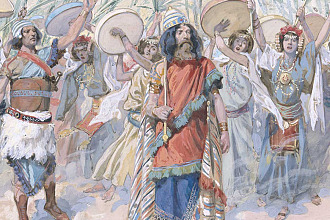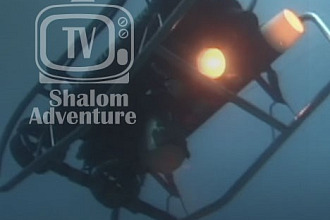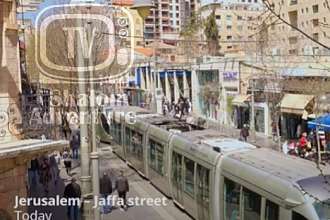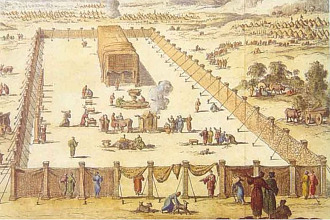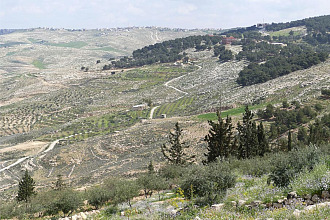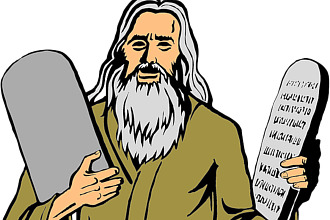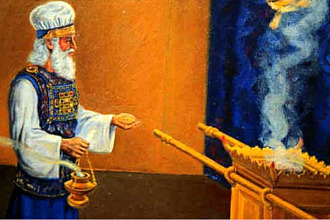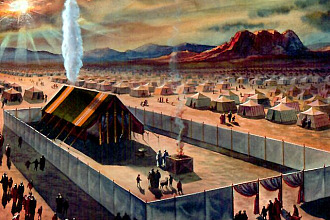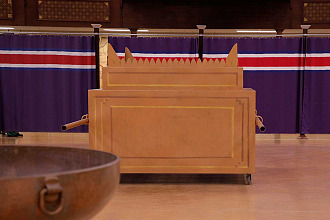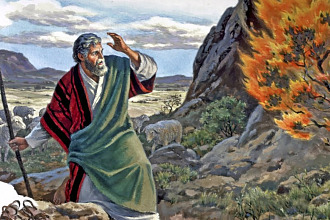Parasha for the Week: Masei: Numbers 33:1 - 36:13
Haftara: Jeremiah 2:4 - 3:4
Brit HaChadasha: Romans 8:1 - 39
Overview:
The Torah names all 42 encampments of Bnei Yisrael on their 40-year journey from the Exodus until the crossing of the Jordan River into Eretz Yisrael. G-d commands Bnei Yisrael to drive out the Canaanites from Eretz Yisrael and to demolish every vestige of their idolatry.
Bnei Yisrael are warned that if they fail to rid the Land completely of the Canaanites, those who remain will be "pins in their eyes and thorns in their sides." The boundaries of the Land of Israel are defined, and the tribes are commanded to set aside 48 cities for the levi'im, who do not receive a regular portion in the division of the Land. Cities of refuge are to be established: Someone who murders unintentionally may flee there.
The daughters of Tzelofchod marry members of their tribe so that their inheritance will stay in their own tribe. Thus ends the Book of Bamidbar/ Numbers, the fourth of the Books of The Torah.
"Never be Satisfied with the Accomplishment of Today"
This week's Parasha, Masei, concludes the fourth Book of the Torah Bamidbar (Numbers). Our sages teach us that not only the contents of a Parasha, but also the name of the Parasha contains a lesson. The name of this week's Parasha, Masei, means "Journey." In this Parasha the Torah records all the 42 places where the Jewish people camped during their forty year "journey" in the Sinai desert. The main emphasis of the Parasha is upon the places they "rested" and what events occurred in some of these places. Yet, the Parasha is called Masei that signifies the fact that "they traveled" rather than "they camped." Rabbi Zalmen Marozov says that the name of the Parasha, Masei, teaches us the main focus of our journey through life. A believer should never be satisfied with the accomplishments of today but always strive for higher. This concept is represented in the name of the Parasha, Masei. For instead of focusing on our achievements and resting places, we must continuously strive to go forward. Even the "stops" and "resting places" in life are for the purpose to gain strength to continue journeying forward and to go from strength to strength in our spiritual journey through life.
"Cities of Refuge"
In this week's reading, God commands the nation of Israel to set aside Cities of Refuge throughout the land. The Lord proceeded to give his people another evidence of his care and tender compassion for the unfortunate and the erring. Six of the cities assigned to the Levites—three on each side the Jordan—were appointed as cities of refuge, to which the manslayer might flee for safety. The appointment of these cities had been commanded by Moses, "that the slayer may flee thither, which killed any person at unawares. And they shall be unto you cities for refuge," he said, "that the manslayer die not, until he stand before the congregation in judgment." (Numbers 35:11, 12.) This merciful provision was rendered necessary by the ancient custom of private vengeance, by which the punishment of the murderer devolved on the nearest relative or the next heir of the deceased. In cases where guilt was clearly evident it was not necessary to wait for a trial by the magistrates. The avenger might pursue the criminal anywhere and put him to death wherever he should be found. The Lord did not see fit to abolish this custom at that time, but He made provision to ensure the safety of those who should take life unintentionally. (PP 515) The roads to these cities were always to be kept in good repair; all along the way, sign-posts were to be erected bearing the word Refuge in plain, bold characters, that the fleeing one might not hesitate for a moment. The Talmud tells us that there were two parallel lines of three Cities of Refuge running from north to south, on each side of the Jordan. The three cities on each side were divided such that each was equidistant from the others and also from the borders—dividing the Land of Israel into equal quarters from north to south. A City of Refuge could only be used by a person who killed another accidentally, but negligently. An alleged murderer would be taken from the city and judged, and returned only if the killing was unintentional. A truly accidental killing, on the other hand, was not punished—a person was liable only if he or she might have taken appropriate precautions and avoided the accident. So the Torah prescribed very different treatment for those who murdered, those guilty of manslaughter, and those who were blameless. Some of the early commentators, such as the Ramban (Nachmanides), said that murderers would also flee to these cities, in order to make their actions look accidental or under the misconception that they would be safe there. Since it took time to clarify who could stay and who would be removed, more cities were needed where murderers were more common. In a trial for murder the accused was not to be condemned on the testimony of one witness, even though circumstantial evidence might be strong against him. The Lord's direction was, "Whoso killed any person, the murderer shall be put to death by the mouth of witnesses: but one witness shall not testify against any person to cause him to die." (Numbers 35:30.) This merciful provision contains a lesson for the people of God until the close of time. It was Mashiah who gave to Moses these directions for Israel; and when personally with His disciples on earth, as He taught them how to treat the erring, the Great Teacher repeated the lesson that one man's testimony is not to acquit or condemn. One man's views and opinions are not to settle disputed questions. In all these matters two or more are to be associated, and together they are to bear the responsibility, "that in the mouth of two or three witnesses every word may be established." Matthew 18:16. We cannot imagine that when we live in a world where not only common street criminals but corporate executives engage in thievery, we will not be tempted to "borrow" that which is not ours. And we cannot delude ourselves by thinking that we can expose ourselves to thousands of murders per year on television and in movies, and we will remain every bit as committed to the sanctity of life. We are, indeed, creatures of our environment. It is our responsibility, then, to build a different environment—to remove poisonous influences from our lives as much as possible, and to surround ourselves with role models, friends and other influences that promote love, life, and holiness. (PP 516)
Haftara: Jeremiah 2:4 - 3:4
The month of Av includes the fast of Tish'a Be'av (9th of Av), the very date of the destruction of the temples of Jerusalem. Both temples were destroyed on the same day but the second more than 650 years after the first. We read from the book of Jeremiah in the Haftara, where we see the reasons for the destruction.
Haftara: It is a call to the house of Israel. "Hear the word of the L-RD, O house of Jacob, and all the families of the house of Israel"(Jer 2:4). The L-rd gives us the spiritual situation of Israel: "Thus says the L-RD: What wrong did your ancestors find in me that they went far from me, and went after worthless things, and became worthless themselves?" (Jer. 2:5). The Lord was happy to bless Israel, to bring them from Egypt and to give them a beautiful country full of milk and honey. However, when they arrived in the Promised Land, they did not remember G-d. The Almighty says through Jeremiah, "They did not say, "Where is the L-RD who brought us up from the land of Egypt?" (Jer 2:6). Even the priests did not try to look for G-d. "The priests did not say, 'Where is the LORD?' Those who handle the law did not know me" (Jer 2:8); even the rulers and the prophets did not know the G-d of Israel anymore. "The rulers transgressed against me; the prophets prophesied by Baal, and went after things that do not profit" (Jer 2:8). What is really worse is that Israel did not want to see the reality of her situation. "You say, 'I am innocent; surely his anger has turned from me.' Now I am bringing you to judgment for saying, 'I have not sinned' " (Jer 2:35).
Unfortunately today the situation has not changed. When I hear Rabbis here in Israel promoting immortality of the soul or reincarnation, that means Greek and Hindu doctrines instead of what is written in the Tanakh, I consider that the situation is the same; the leaders today are going to modern Baals or Astartes for light instead of going to G-d. But the Almighty is good. He loves his people and always calls the faithful one to repentance and to come back to him. "Have you not just now called to me, "My Father, you are the friend of my youth? (Jer 3:1). Oh yes, G-d is our Father. Let's go back to him.
Brit HaChadasha: Romans 8:1 - 39
The cities of refuge appointed for God's people were a symbol of the refuge provided in Mashiah. We have many texts in the brith Hachadasha that affirms that we have refuge in Yeshua Hamashiach, he said in Matthew "Come to me, all you who are weary and burdened, and I will give you rest." (11:28). And Rabbi Shaul gives us this assurance "since we have been justified (declared tsadik) through faith, we have peace with God through our L-rd Yeshua Hamashiach, through whom we have gained access by faith into this grace in which we now stand. And we rejoice in the hope of the glory of G-d. (Rom. 5:1-2)
"The same merciful Savior who appointed those temporal cities of refuge has by the shedding of His own blood provided for the transgressors of G-d's law a sure retreat, into which they may flee for safety from the second death. No power can take out of His hands the souls that go to Him for pardon. "There is therefore now no condemnation to them which are in Mashiah Yeshua." (Rom 8:1) "Who is he that condemns? Yeshua HaMashiah, who died — more than that, who was raised to life — is at the right hand of God and is also interceding for us. ;" that "we might have a strong consolation, who have fled for refuge to lay hold upon the hope set before us." (Romans 8:34; Hebrews 6:18). (PP 516). The full lesson of the city of Refuge is lessons of love. Yeshua loved us at the point of giving his life for our forgiveness and salvation. That is why if we accept Yeshua as the Mashiach, nothing will separate us from the love of G-d. Rabbi Shaul put it that way "Who shall separate us from the love of Mashiach? Shall trouble or hardship or persecution or famine or nakedness or danger or sword? No, in all these things we are more than conquerors through him who loved us. For I am convinced that neither death nor life, neither angels nor demons, neither the present nor the future, nor any powers, neither height nor depth, nor anything else in all creation, will be able to separate us from the love of God that is in Y'shua our Messiah, our Lord.

